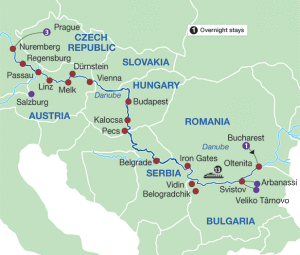pelagos
Iron Gate(s), The
The Iron Gate(s) is the name given to a gorge on the River Danube that forms part of the boundary between Serbia and Romania. A century ago, Nicolae Densusianu proposed The Iron Gate as the location for the Pillars of Heracles, on the Danube in ancient Dacia, modern Romania.
A recent book [1742] by Antonije Shkokljev & Slave Nikolovski–Katin has related an ancient version of the ‘Labours of Hercules’ based in the Balkan-Danube region.
 Recently, Ranko Jakovljevic expressed the view that the Iron Gate section of the Danube in Serbia was the location of Atlantis.
Recently, Ranko Jakovljevic expressed the view that the Iron Gate section of the Danube in Serbia was the location of Atlantis.
A paper presented to the 2008 Atlantis Conference by Ticleanu, Constantin & Nicolescu [750.375] has the ‘Pillars of Heracles’ located at the Iron Gate but placed Atlantis a little further west on what is now the Pannonian Plain.
>In 2020 Veljko Milkovic also placed the ‘Pillars’ at the Iron Gates on the Danube and Atlantis in the Pannonian Basin(c)(d) in his book Panonska Atlantida [1932].<
This minority view of Atlantis located in Eastern European is seen by a few commentators to be vindicated by the literate Vinca culture(b) of the Danubian region, although the Schoppes see the Vinca people as refugees from their original home in the Black Sea region(a).
For me, all those theories conflict with Plato’s unambiguous statement that the invading Atlanteans came from the west (Tim.25b & Crit.114c). In fact, what Plato actually said was that the invasion came from the Atlantic Sea (pelagos). Although there is some disagreement about the location of this Atlantic Sea, all candidates proposed so far are west of both Athens and Egypt.
(a) https://web.archive.org/web/20190819053842/https://www.black-sea-atlantis.com/schoppe.pdf
Gilbert, Adrian
 Adrian Gilbert (1949- ) is the well-respected author of a number of books[326] and television documentaries on what are considered ‘fringe’ subjects. He is probably best known for The Mayan Prophecies[0327] co-authored with Maurice Cotterell as well as The Orion Mystery co-authored with Robert Bauval. He has also studied connections between the Bible and astrology[0328].
Adrian Gilbert (1949- ) is the well-respected author of a number of books[326] and television documentaries on what are considered ‘fringe’ subjects. He is probably best known for The Mayan Prophecies[0327] co-authored with Maurice Cotterell as well as The Orion Mystery co-authored with Robert Bauval. He has also studied connections between the Bible and astrology[0328].
Influenced by the ‘prophecies’ of Edgar Cayce he believes that Atlantis, or at least part of it, had existed in the West Indies near Bimini and that following its final inundation around 10,500 BC he claims that refugees fled to the Yucatan Peninsula where they developed the Mayan civilisation.
>In The Mayan Prophecies, Gilbert and Cottrell, in an attempt to justify their claim that Plato was referring to an American Atlantis, have offered a flawed translation of Timaeus 24-25 [p166], using the word ‘ocean’ where the Greek text uses the words ‘pontos’ or ‘pelagos’ which both mean sea not ocean. The first English translation of Plato’s text by Thomas Taylor correctly used the word sea for ‘pontos’ and ‘pelagos’, including the term ‘Atlantic Sea’.
For the Greeks the word ‘ocean’ (okeanos) only referred to the huge sea that flowed around the known world.
Leaving all that aside we should note that Herodotus, who flourished after Solon and before Plato, was quite clear that there were only three continents known to the Greeks; Europe, Asia and Libya(b) in fact, prior to Herodotus only two land masses were considered continents, Europe and Asia, with Libya sometimes considered part of Asia. So when Plato does use the word ‘continent’ (Tim. 24e-25a, Crit. 111a) we can reasonably conclude that he was referring to one of these land masses, and more than likely to either Europe or Libya (North Africa) as Atlantis was to the west of Athens and Egypt, ruling out Asia.<
Gilbert’s principal interest is the Mayan calendar and the fact that it will reset to zero at midnight on the 21st of December 2012. This coincides with the earlier views of the American archaeologist, Michael D. Coe, who wrote about the significance of 2012 as early as 1966 in his book, The Maya. However, he has suggested three different dates between Dec. 24 2011 and Jan 11 2013 in various editions of his book(a).
It is claimed that this date will coincide with catastrophic events that occur cyclically every 5,000 years. Many authors, such as Patrick Geryl have speculated on the nature of the calamities that this date may bring.
(a) https://rationalwiki.org/wiki/2012_apocalypse
(b) The Histories, Book 4. v.42 *
Persian Wars
The Persian Wars are believed by some to have been the inspiration for the story of the Atlantean invasion described by Plato. Giuseppe Bartoli was apparently the first, in 1780, to make such a claim. Not too long afterwards Pierre-André Latreille supported the same idea[1018].
This idea fails on two principal grounds, date and geography. Since the Persian War took place around 500-449 BC, this would make it subsequent to Solon’s visit to Egypt (570-526 BC) and Persia was east of Athens and Egypt, while the Atlanteans came from the west (Tim.25b & Crit.114c)! In fact, what Plato said was that the invasion came from the Atlantic Sea (pelagos). Although there is some disagreement about the location of this Atlantic Sea, all candidates proposed so far are west of both Athens and Egypt.
Since the Persian War took place over half a century after Solon’s death, in some ways, the suggestion that the Persian conflict inspired Plato’s Atlantis story, implies that Plato lied about Solon as the conduit for the account, which is completely at variance with the acceptance of Plato as a man of unquestioned integrity.
>Nevertheless, a number of other commentators such as W. H. Babcock, Hans Diller, and Paul Jordan have perceived elements of the Persian Wars in the Atlantis story. Even the arch-sceptic Benjamin Jowett sought to associate the story of Atlantis with the Persian Wars.<
Apart from this date discrepancy, Jürgen Spanuth lists[015] other divergences of the Persian Invasion theory from Plato’s text. Spanuth, together with many other authors, favours the Sea Peoples or as he puts it ‘the North Sea Peoples’, being the Atlanteans of Plato’s tale.
However, Pierre Vidal-Naquet, a prominent Atlantis sceptic, is adamant that the Persian Wars, with some modifications, parallel the Athenian war with Atlantis. William Babcock expressed a similar opinion in the early years of the 20th century. Acceptance of this view would rule Solon out as Plato’s source and undermine the credibility of the whole narrative.
Keep in mind that you can also find parallels between many of the European wars of the last few hundred years.
In the mid-20th century, W. A. Heidel, an Atlantis sceptic, claimed(a) that an expeditionary naval force was sent by Darius in 515 BC under Scylax of Caryanda to explore the Indus River, which eventually encountered waters too shallow for his ships, was the inspiration behind Plato’s tale of unnavigable seas!
He further claimed that Plato’s battle between Atlantis and Athens is a distortion of a war of invasion between the Persians and the Indians.
In late 2008 a new theory about Atlantis, was launched(a) by August Hunt that purports to link Atlantis with the Persian Empire with either Persepolis or Susa as the Atlantean capital described by Plato. He also offers the curious explanation for Plato’s 9,000 years for the age of Atlantis as being in reality a reference to the number of Athenians present at the Battle of Marathon! His short book is entitled Atalante and the Persian Empire[1413]
Jim Allen in a discussion of a number of ancient Persian cities, notes[877] that some are circular and often had concentric walls, suggesting that they may have been the inspiration for Plato’s description of Atlantis’ capital city!
If the Persians were in fact the Atlanteans of Plato’s story, it seems rather odd that their invasion fleet, as recorded by Herodotus (Bk.7.89), included 200 Egyptian ships, while at the same time that Athens and Egypt were supposedly allies in opposition to Atlantis!
(a) https://www.jstor.org/stable/20022944?seq=1#page_scan_tab_contents
Ocean or Sea
Ocean and Sea are words employed by classical writers in a manner different to our present usage. Originally the Greek word Oceanos referred to the ‘Great River’ that was assumed to flow around the then known world.
>That great resource Theoi.com notes(j) “In the ancient Greek cosmogony the RIVER OKEANOS (Oceanus) was a great, fresh-water stream which encircled the flat disc of the earth. It was the source of all of the earth’s fresh-water–from the rivers and springs which drew their waters from it through subterranean aquifers to the clouds which dipped below the horizon to collect their moisture from its stream.”<
Livio Stecchini wrote that “the existence of a river Oceanus as an extension of the Nile along the Equator was considered a serious reality in Greek times” (e)
Anton Mifsud has pointed out[209] that Homer used the word ocean for the sea and in fact used the same word for the Tyrrhenian ‘Sea’ (a). Both Seneca and Cicero referred to the Mediterranean Sea as the Atlantic Ocean(b)(c). Diodorus Siculus notes further that the word for ocean has even been applied to the Nile(d) by Homer. Herodotus also recorded that Homer called the Nile ‘Okeanòs’, as it was generally believed at the time that it began the Atlantic Ocean and flowed across the equator to Egypt(f)and ended in an ‘ocean’, the Mediterranean. (quoted by J.H. Agnew) [1232.123]
Georgeos Diaz-Montexano made a similar point when he offered the simplistic explanation that the classical writers had three words for bodies of saltwater; pontos (small), pelagos (medium) and okeanos (large). Plato always referred to Atlantis as being in a pelagos.
Alfred C. Moorhouse, among others, has pointed out(a) that ‘pontos’ is seemingly derived from words meaning ‘path’ or ‘bridge’, which in turn gave us the Latin ‘pons’ for bridge. Understandably, early sailors preferred shore-hugging and the use of trusted sea routes. ‘Pelagos’ refers to open seas, probably when out of sight of land. Agnieszka Adamowicz-Pospiech suggested that the words were used to distinguish “between the familiar and the foreign”.(h)
George Sarantitis suggested that ‘Pelagos’ “usually denotes a small sea in the shape of an embrace and contains islands, bays, peninsulas”, while ‘Pontos’ “denotes a sea with strong currents that require extra effort to navigate.”(i)
Carlos Bisceglia in his Atlantis 2021, made an important observation – “If Plato had thought that Atlantis was an island located in what we today call the Atlantic Ocean, he would have written that his Atlantis was ‘in the Middle of Okeanos’.” For the Greeks, Okeanos referred specifically to the great river that encircled the known world. Instead. he placed Atlantis in the Atlantic Sea, which in my opinion brings us back to the Mediterranean.
We can conclude therefore that since Plato never used the term ‘ocean’ in connection with Atlantis there is no proof that he was referring to our present-day Atlantic, while in all likelihood he was indicating the western basin of the Mediterranean or the reported large inland sea where the chotts of Tunisia and Algeria are all that remains of it today.
(a) Odysseus x. 508,
(b) Quaestiones Naturales,
(c) Somnium Scipioni
(d) Biblioteca Storica i.
(e) Ancient Cosmology (archive.org)
(g) https://www.jstor.org/stable/636658
(h) See Archive 6248
(i) The Atlantis Hypothesis (2nd Conference)(Heliotopos, Athens, 2010) p.400
(j) OCEANUS – Earth-Encircling River of Greek Mythology (theoi.com) *
